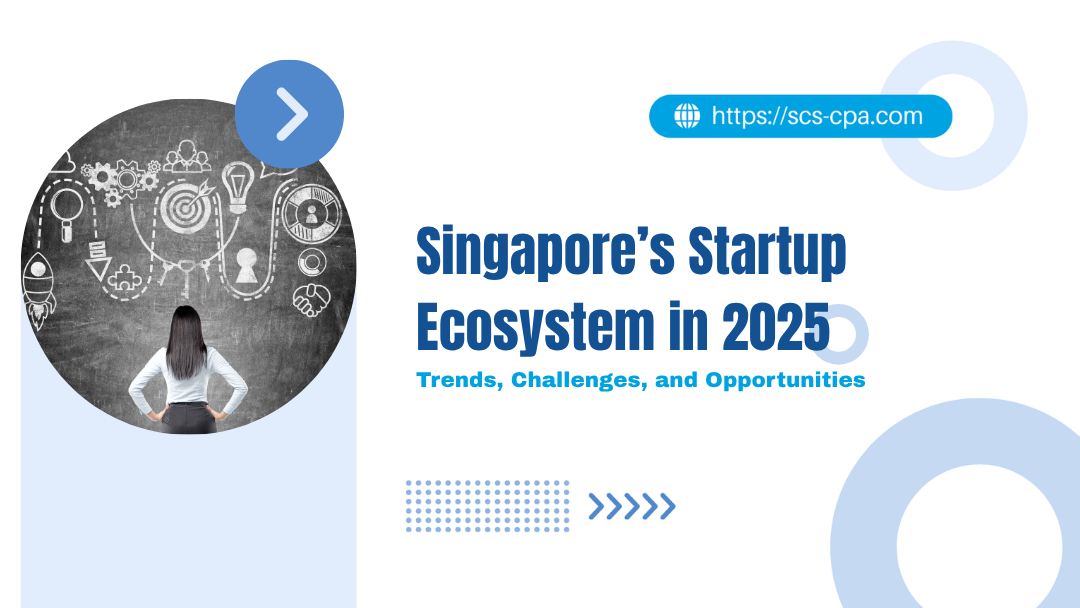
Singapore is becoming the top hub for innovation and business in the Asia-Pacific region. As we approach 2025, the ecosystem is maturing. At present, the Lion City has
- Better funding
- A focused support from the government.
- A strong focus on important areas like Deep Tech and Green Economy solutions.
In this guide, we provide an overview of the current startup ecosystem, trends and important support systems. If you are looking to expand your reach, we have also listed opportunities for you to explore.
Overview of the Business and Startup Ecosystem

Singapore’s commitment to innovation has led to impressive growth. It has changed from a regional player to a global leader.
Snapshot of the Startup Ecosystem
Singapore’s startup ecosystem is strong and competitive. There are over 4,500 active startups, supported by over 510 investors and 220 incubators and accelerators. Moreover, it received a lot of financial support, with more than US$8 billion in equity funding raised in 2022.
Thanks to these factors, the city is ranked 4th globally among startup ecosystems, showing over 44% growth since 2020.
Incorporation and Foreign Investment Landscape
Singapore’s appeal goes beyond its tech industry. It is an efficient regional headquarters for multinational companies and foreign businesses. By 2024, over 81,000 foreign-owned enterprises were registered, showing the nation’s strategic location and regulatory benefits. It also offers easy access to the wider ASEAN market.
Most investment comes from major economies like the USA, UK, Japan, and Mainland China. Capital mainly targets finance, professional services, and high-value manufacturing. Importantly, Singapore serves as a gateway to the Asia Pacific. It has over 60 Double Tax Avoidance (DTA) agreements. It also has several Free Trade Agreements (FTAs). These agreements help make regional trade easier. They also reduce tax problems for international growth.
Sources:
- (DOS) | SingStat Table Builder – Enterprise Landscape By Ownership
- (DOS) | SingStat Table Builder – Foreign Direct Investment In Singapore By Source Economy (Flows)
SG’s Startup Ecosystem: Government Agencies, Initiatives and Support

The active role of government agencies gives Singapore a competitive edge. State-backed programs are not just regular grants. They are strategic, sector-specific initiatives that reduce investment risks and speed up market entry.
Core Support Networks
The Startup SG Network is the main structure. It connects thousands of startups with mentorship, grants, and over 400 Venture Capital (VC) firms. Agencies like Enterprise Singapore (ESG) and the Economic Development Board (EDB) guide development with targeted funding. Some key programs include:
- Climate Impact Fund: This fund aims to develop solutions for carbon trading, sustainable infrastructure, and renewable energy.
- Maritime Tech Initiatives (MPA): This initiative offers funding and test areas for new ideas in logistics and maritime industries. It takes advantage of Singapore’s status as a key port.
The nation’s focus on long-term sustainability is shown in the Green Plan 2030. This plan directs investment towards sustainability-focused innovation, creating new opportunities for ESG-centric startups.
Regulatory Ease and Incentives
For entrepreneurs, the red tape is reduced. The Accounting and Corporate Regulatory Authority (ACRA) offers an easy online portal. The whole incorporation process can often be done remotely within hours. This ease is paired with attractive tax incentives. The Start-Up Tax Exemption (SUTE) gives a big tax break on the first S$100,000 of taxable income for the first three years. There is also a zero capital gains tax, which is very appealing for investors planning exit strategies.
Accelerators, Incubators and Key Events in 2025
Startups, accelerators, and incubators offer crucial structural support. Meanwhile, major events serve as essential platforms for networking, funding, and securing deep-pocketed corporate partnerships in 2025.
Key Accelerators and Incubators
These organisations provide mentorship, access to corporate partners, and capital:
- Startup Bootcamp FinTech Singapore: A prime example of niche focus. This program specialises in developing financial technology innovations, often securing pilot programs with major banks like DBS.
- InspirAsia: Focused on supporting tech-driven startups with an explicit goal of Southeast Asian expansion, providing logistical and regulatory guidance for scaling regionally.
- University-linked and Corporate Accelerators: Programs affiliated with universities and large corporations. It enhances niche sector innovation by providing access to IP, research labs, and early-stage capital.
Major Startup Events in 2025
The calendar is packed with globally recognised events that define the regional tech landscape:
- Singapore Week of Innovation & Technology (SWITCH): The flagship event fostering Deep Tech and business partnerships across Asia and Europe.
- Echelon Asia Summit: A major platform showcasing regional startup innovation, critical for securing investor engagement and media exposure.
- GITEX Asia: Held in Singapore in April 2025. This major tech event highlights global technology trends, attracting international participants and business leaders.
- Singapore FinTech Festival (Nov 12-14, 2025): Asia’s premier fintech event, focusing on next-gen finance technology and ecosystem growth. It is the must-attend event for anyone in the digital financial services space.
Upcoming November 2025 Key Ecosystem Events
Beyond the major festivals, a range of targeted seminars and sessions provides critical networking and knowledge opportunities:
- Fukuoka City Business Attraction Seminar: Focuses on cross-border expansion opportunities, specifically bridging Singaporean startups with the Japanese market.
- BLOCK71 Info Session (AI Accelerate): A focused online session detailing the special growth track for Artificial Intelligence startups, crucial for those in Deep Tech.
- Morning GEMS: Growth Beyond Borders: A session focusing on Agribusiness, Food Tech, and Sustainability, highlighting regional expansion in these growing sectors.
- Tech Talks: Inclusive Spaces: Discusses using technology to create more inclusive spaces. Hence, it is relevant to social enterprises and smart city solutions.
- TEA JAM: AI for All (General Assembly & JDI): A collaboration focusing on building inclusive workplaces and the future of work in the age of intelligence.
- ACE SG January Incubation Programme: Provides information on a core incubation program. It targets early-stage startups seeking structured support at the beginning of the year.
More event updates here: Startup SG | Events
Challenges for Startups and Foreign Businesses: Managing Risk

While the opportunities are compelling, Singapore’s startup ecosystem is high-stakes and demands rigorous planning. Founders and investors must actively manage the following critical risks:
1. High Operational Burn Rate and Capital Efficiency
Singapore is one of the most expensive cities in the world. The high cost of commercial real estate and a tough job market lead to a high operational burn rate. For startups, this means they need to use their capital wisely and find ways to earn money faster than in cheaper markets. Thus, having good financial planning and cost control is essential.
2. Talent Scarcity and Mandatory Localisation
The talent pool is skilled. However, there is strong competition for specialised roles. This is especially true in Deep Tech, AI/ML, and Cybersecurity. The Ministry of Manpower (MOM) has strict rules on Employment Pass (EP) quotas and hiring foreign workers. This is a challenge. You need to attract talent. At the same time, you must follow government rules. These rules include local skills transfer and mandatory localisation.
3. Regulatory Risk and Director Personal Liability
Following the law is more than just filling out forms. Foreign businesses need to have a resident director and a qualified company secretary. Importantly, directors can be held personally liable for some breaches of the Companies Act (ACRA). This makes a standard requirement a serious legal risk. Careful management of EP quota compliance and keeping up with changing reporting standards is crucial to avoid heavy penalties.
4. Competitive Funding and High Bar for Differentiation
There are many active startups, making seed and Series A funding very competitive. Investors in this established market usually look for three things. They want to see successful examples, technology that can grow easily, and a clear plan to become a Unicorn. Entrepreneurs should focus on their local market first. They need to highlight what makes their product better than others. This is important in the competitive Asian market.
Opportunities and Future Outlook: High-Return Sectors

Singapore’s future growth is highly concentrated in areas aligned with the government’s vision and global capital flows. Doing so provides exceptional growth potential for those who target them.
1. Regional Hub and Unmatched Market Access
Singapore’s strategic role as the Asia-Pacific operational and financial hub remains unmatched. For startups, this means immediate, high-trust market access across ASEAN, supported by extensive trade agreements that facilitate rapid, cost-effective scaling.
2. Green Economy and Sustainable Innovation
The expansion of the Green Economy is arguably the most significant future opportunity. Moreover, it is fueled by dedicated climate funds, becoming a global push toward international ESG trends. Areas poised for explosive growth and high investment returns include
- carbon capture technology,
- sustainable supply chain management, and
- green finance
3. Deep Tech and AI Integration
Government investment in research and development (R&D) is pivoting heavily toward Deep Tech and practical AI integration. With the rise of AI, startups began partnering with university-linked incubators to solve complex, high-value problems in
- Logistics
- Healthcare
- Finance
These initiatives will attract premium funding and more strategic partnerships.
More reads: Why Global Businesses Are Incorporating in Singapore: Top Countries, Key Trends, and Compliance Insights
SG’s Startup Ecosystem: Your Gateway to Asian Growth
Singapore’s startup ecosystem offers a mature, high-stakes, high-reward environment. For entrepreneurs, it is a place where administrative efficiency meets global capital. For investors, it offers a secure, legally certain foundation to deploy funds into the most dynamic trends shaping the future of the Asia-Pacific economy.
Navigating the cost of talent and regulatory requirements demands local expertise. Are you prepared to leverage this high-potential ecosystem?
Thinking of Expanding
You Biz?
Let’s connect and discuss
all the essentials!
Corporate Income Tax Malaysia: Rates, Filing, and Strategic Compliance
Understand Malaysia’s corporate income tax system. Learn current tax rates, SME tiers, filing deadlines, LHDN requirements, penalties, and more.
Understanding the Core Types of Audits and Their Roles in Accounting in Singapore
Learn the key types of audits in Singapore to build trust and stay compliant. Examples are statutory, internal, GST, and forensic.
Tax Return In Singapore: A Friendly 2025 Guide
Want to be a responsible business owner? Read this guide to tax return in Singapore to help understand tax filing and play your part.



